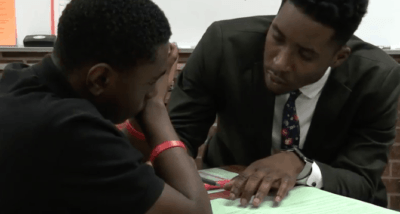In a Burlington event Monday, participants debated who should provide accountability for charter and private schools: parents, the public, or government?
Four panelists discussed charter and private school oversight and effectiveness on Monday night. The debate was the second in a three-part series in smaller towns and cities in North Carolina hosted by the NC Institute of Political Leadership.
Participants included Rep. Jeffrey Elmore, R-Alleghany, Wilkes, Rep. Graig Meyer, D-Durham, Orange, John Locke Foundation’s Vice President of Research and Director of Education Studies Terry Stoops, and NC Justice Center’s Director of Education and Law Project Matt Ellinwood.
The evening focused around one question: “Should North Carolina tighten oversight of tax-funded charter schools and private schools?” Spectrum News political reporter Loretta Boniti moderated the debate.
Stoops, in response to a question on regulation of charters and vouchers, said it is parents who can best decide which school meets their children’s needs. Unlike charters, private schools are not required to release student performance data, including on students who attend through taxpayer dollars.
“(Parents) are the primary vehicle for accountability in any choice system,” Stoops said. “So the fact that the public might not have the test scores is irrelevant, because as long as the parent has the student performance scores, they can determine whether … their child is receiving a good education or a bad education.”
Meyer, however, argued the lack of requirements means little information to inform good policy around voucher programs.
“We don’t have any way of assessing student performance in voucher-funded schools right now,” Meyer said. “And so we can’t even do an apples-to-apples comparison on the very limited basis of the state testing that we use. So we don’t know whether that’s a good investment for our kids or for our public.”
Elmore said private schools, which have to administer nationally-standardized tests, have information available if parents ask for it while touring them. He said these data are better when comparing state-to-state performance.
“So in a way really what privates are allowed to do, it gives us a better nationwide comparison as a policymaker looking at the bigger numbers,” Elmore said. He later, in response to a question on the possibility of school information being gathered by the state, said, “We have to be careful trying to replace the role of the parent as the government.”
Ellinwood argued that the most important comparison is between specific schools in North Carolina.
“I think it would be much better to have a comparison that’s applicable between North Carolina schools,” Ellinwood said. “I think that we have students who are moving from a public school to a private school, we want to know if their education’s been approved by making that change. So the point of comparison ought to be the school that they came from.”
Stoops and Elmore both said providing families with more choices is something that would better student outcomes in rural areas, which do not typically have as many private or charter schools.
“As long as we have charter schools that are in those areas providing a choice for those students, I think it’s beneficial,” Stoops said, “And this is also the reason why charter management organizations are so important to bring that outside capital to those rural areas that will enable them to open these charter schools.”
Ellinwood said new schools can have a magnified impact in smaller communities.
“If you create a charter high school, then all of a sudden the existing public schools still have the same fixed costs, they have to provide transportation, they need a principal … all of those kind of costs remain the same but you have less money due to dwindling enrollments,” Ellinwood said.
He pointed to negative outcomes from virtual charter schools, which Stoops said are a good option for rural students.
“Unfortunately, we’re giving people choices but they’re not quality choices that are any better than, or in many cases, substantially worse,” Ellinwood said.
Panelists on both sides of the aisle agreed that, in both traditional public and choice schools, accountability that relies heavily on achievement does not paint a full picture of school quality.
“We shouldn’t just narrow it down to test scores,” Stoops said. “Parents pursue options for lots of different reasons, academics being one. If a child is bullied, they would want to move a school, if they’re in an unsafe environment in their school, if they’re finding that their teachers are not high-quality teachers. All these are good reasons why students would want to move from a traditional district school to a school of choice.”
Meyer said elements like school climate, teacher and student retention, and absenteeism could create a more comprehensive accountability system.
“Our grading scale is based almost exclusively on one snapshot in time: end-of-grade tests,” Meyer said. “It overemphasizes whether students are reaching proficiency rather than whether they’re making growth in their learning and there are many other states that use a wide variety of additional measures to look at the quality of the school besides just those tests.”
Traditional public schools gaining charter-like flexibility, as they are allowed to do through the state’s restart status, was another point of common ground. Ellinwood said he has heard public school principals pushing for flexibility when it comes to both the school calendar and staffing. Elmore said individual public schools should have curriculum flexibility.
“The way our current system is set up, with the standards that are put forth, that flexibility in curriculum sometimes is very difficult,” he said. “That’s a concern of mine, because … I’ll just use the math sequence as an example. The math community is very divided on that. And what could work best maybe in my LEA, is different from what works best in the neighboring LEA.”



